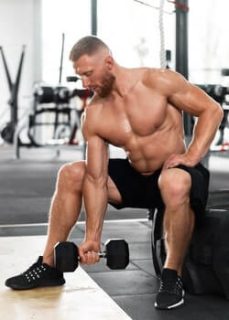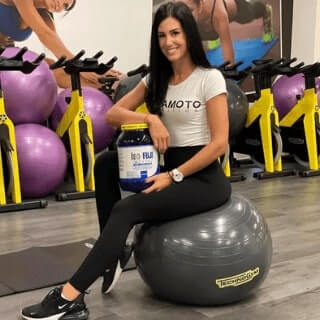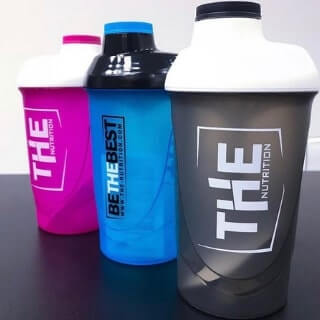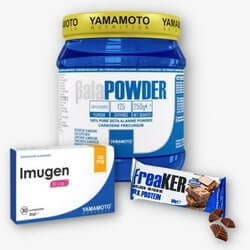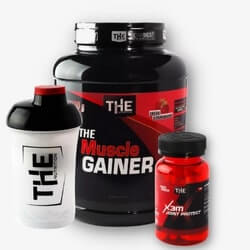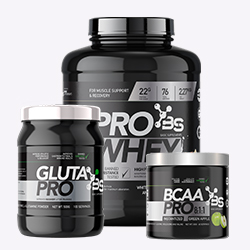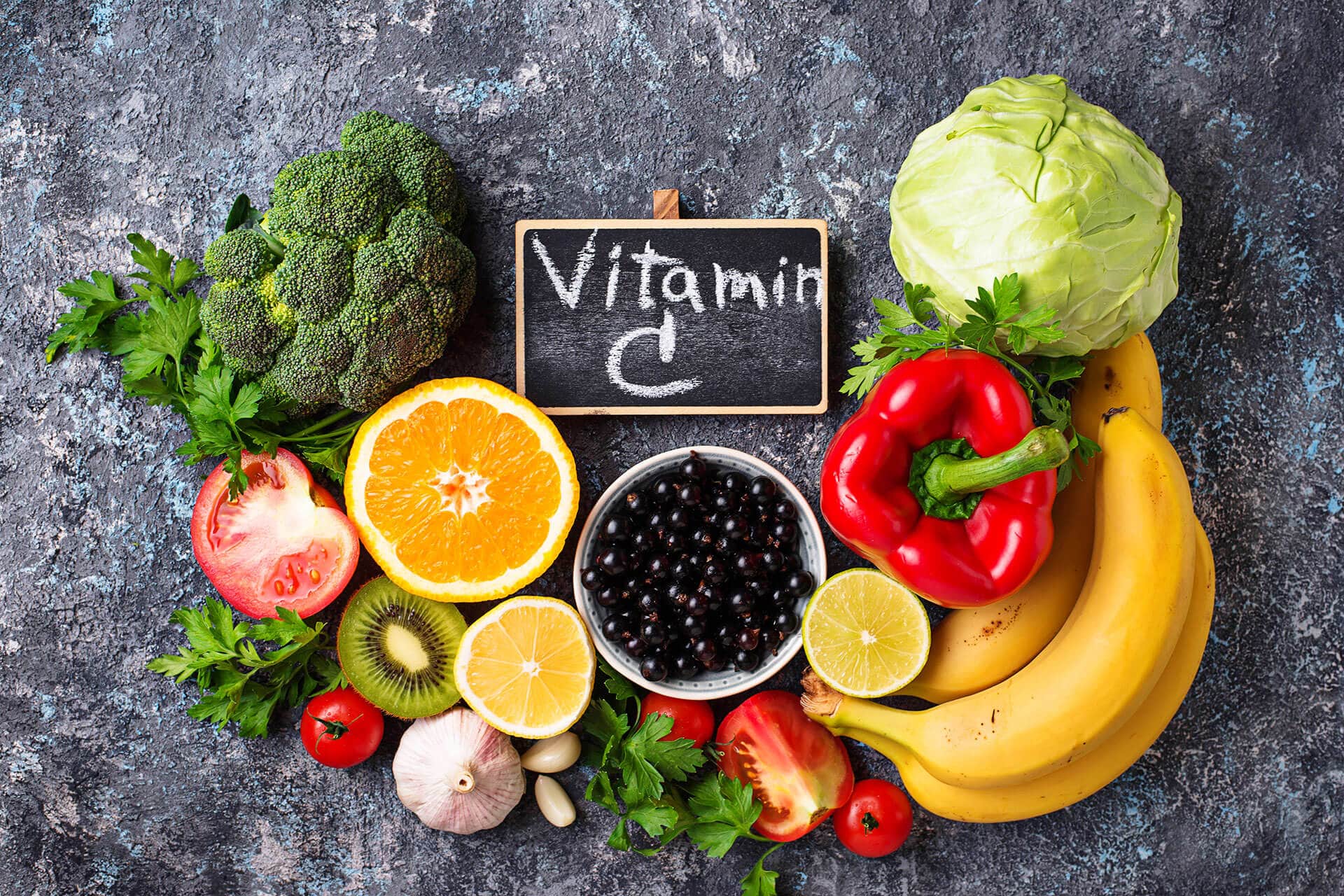TRAINING BENEFITS

TRAINING BENEFITS
One of the very common criticisms that are made of the possibility of using dietary supplements by athletes is that they “give athletes the opportunity to gain an advantage over others”.
Well, isn’t that the point?
Isn’t the point of a sports competition to be a winner at something? Isn’t the point of preparation and coaching to achieve a competitive advantage over others?
Many try to create an objective “fair play” atmosphere among athletes by making them compete evenly and fairly. But it’s just not possible. Everyone’s goal is to win, so the best coaches, nutritionists, and others are often hired. Therefore, without too much theorizing, sports and dietary supplements are just one of the very good trump cards that can help an individual to be better, in terms of achieving better results.
CHO – HYDROLYZED PROTEIN
Protein Hydrolysate is extracted from the entire protein chain (e.g., Whey or Casein) and essentially consists of smaller peptides (Di and Tripeptides) and Amino acids after hydrolysis of the whole protein. Hydrolyzed forms seem to give very good results, and according to some studies even better compared to whole proteins. One study examined how the combination of hydrate and hydrolyzed protein affects the body composition of subjects, as well as protein synthesis during combined physical fitness protocols and weight training. Parameters were also measured in post-workout periods.
Twenty healthy men participated in the study in the evening hours every day and after a predetermined diet regime that day. In the evening, subjects would perform a two-hour training session during which they consumed shakes: 0.15g/kg of carbohydrates and 0.15g/kg of hydrolyzed protein every hour of training.
The other group only ingested water during training. For an exerciser weighing about 90kg, these shakes would contain about 13.6g of carbohydrates and just as much hydrolyzed protein. Subjects of the first group would take two additional shakes in the recovery phase after training, and they would spend the night under the supervision of researchers in order to measure the parameters as accurately as possible.
During training, protein synthesis increased by 29-48%. During the night, protein synthesis in the group that consumed shakes was about 19% more pronounced compared to results in the water-only group. However, the researchers noted that the frequency of protein synthesis did not change during 9 hours of rest during the night in both groups, i.e., the process took place almost equally all the time (although, of course, protein synthesis was more pronounced in the first group).
The researchers concluded that even in the dormant phase, the combination of carbohydrates and proteins promotes protein synthesis. Also, even in the case of optimal sports nutrition (both groups of subjects had an identical diet before training), the combination in the form of supplementation gave positive consequences in the form of more pronounced protein synthesis, but there is no impact on the frequency of this process.
What we should remember from this study is that the intake of carbohydrates and proteins creates an anabolic environment in the body, even when the individual is well-fed. Further, the scale of 50-50 in the combination of hydrate and protein supplementation seems to give quite good results. In the end, the anabolic environment induced in this way remains almost the same over a period of 9 hours.
Perhaps different results would be obtained if the last meal of the day contained slowly digestible proteins.
Another study examined the effects of protein and/or hydrate intake on protein synthesis during weight training. Ten healthy men participated in two experiments in which they took either carbohydrates or carbohydrates and proteins (in the form of shakes in both cases), during a two-hour weight training session. Subjects received pre-workout shakes and every 15 minutes during exercise, a total of about 13.5g of carbohydrates with or without protein (the same dose of protein) for those who weighed about 90kg.
Protein consumption during training reduced protein breakdown by about 8.4% compared to subjects who consumed only carbohydrates in shakes. Also, protein intake increased protein oxidation and synthesis rate by 77 and 33%, respectively. Thus, even in the state of satiety, protein intake through supplementation stimulates protein synthesis in the body and skeletal muscles. Significantly more pronounced than if it was achieved by the exclusive intake of carbohydrates.
Strenuous weight training, especially if the exerciser places an emphasis on negative contractions, causes damage to muscle tissue, which further causes the degradation of protein structures in the working muscles. This can further cause decreased performance at work, then the activation of intramuscular enzymes and inflammatory processes in the muscles. But if the exerciser could recover faster and better, it means that he is able to return to the gym sooner for a new workout, fresh and full of energy. For example, the intake of quality milk, which is rich in both carbohydrates and proteins, can reduce the degradation of muscle tissue and/or increase protein synthesis, which in any case would reduce the negative consequences of strenuous weight training.
In one study, male subjects were divided into four groups. In one, they took water, in the other, a sports drink rich in carbohydrates and proteins, in the third, a milk-based shake that was also rich in carbohydrates and proteins, and in the fourth study, they took only milk. Based on the results of the measured parameters, the researchers concluded that the indicators of muscle fiber damage were significantly lower in the groups that took either milk or milk-based shake for a period of 48 hours after the weight training. This leads to the conclusion that the intake of milk or milk-based supplements can improve recovery after training, that is, faster “repair” muscle tissues and muscle functions.
CHINESE PLUM / JAPANESE APRICOT
In one animal study, researchers examined the effect of this fruit extract on the recovery of animals after tiring exercises. One group of animals had a regulated dietary protocol, while other groups with the same diet received supplementation of 0.15%, then 0.3%, and 0.9% of the extract of this fruit for four weeks.
During the fifth week, all the animals underwent a new “training”. Finally, the researchers concluded that supplementation with the extract of this fruit reduces the presence of lactate acid in the working muscles and that increasing the dose of the extract proportionally further reduces the presence of lactate (the least lactate acid was in the muscles of the group that received the highest concentration of the extract – 0.15%). Fruit extract significantly reduces the activity of lactate dehydrogenase and increases the activity of citrate synthase in skeletal muscles, immediately after the exercises.
What could this mean for the exercisers?
Approximately, the extract of this fruit can improve performance during the workout, as well as recovery after training, most likely through an increase in the aerobic capacity of skeletal muscles, and also the researchers believe that it can have an impact on the increased burning of body fat during training.
ARTICHOKE AND COCOA INDICA
One study involved rowers from the Polish rowing team divided into two groups, a total of 22 subjects. One group received doses of 400mg of artichoke leaf extract 3 times a day for 5 weeks, while the other group received a “placebo”. At the beginning and end of the study, all subjects performed a load test on a rowing ergometer.
The researchers primarily observed how the strong concentration of antioxidants in this extract affects rowers and their work. They learned that the group taking the extract achieved very high values of total antioxidant capacity in the blood plasma.
Another herb, Cocinia Indica, is traditionally used in India to treat diabetes. However, for now, there are not many controlled studies on the effects of this plant on sports performance. We can ask ourselves what could happen when combining the extract of this plant, hydrates, and amino acids. Especially, if for now, we know for sure that the extract of this plant has a rather strong hypoglycemic potential, which comes to the fore precisely in patients suffering from diabetes.
In one study, the sports association ISSN presented scientific views regarding the timing of nutrient intake. It is important to point out that the planning of daily meals is an important strategy that every more serious athlete must have. In the published study, the most significant theses would be:
- The intake of carbohydrates with or without protein during weight training increases the presence of glycogen in the muscles, reduces tissue damage, and promotes more pronounced adaptations to training in the rest phase. This also happens with acute (individual) consumption of these nutrients, especially with prolonged intake over time.
- Amino acid intake, primarily essential AKs, in the period after training (up to 3 hours after training), has been shown to enhance protein synthesis in muscles, and additional hydrate intake increases these processes correlatively. Also, the combination of carbohydrate and protein intake gives the most optimal results.
- During prolonged weight training, it seems that the variation of nutrients consumed in the period around the training, as well as the variation of doses of these nutrients, gives better results, thus forcing the body to adapt more intensively.
- Adding creatine (0.1g per 1 kilogram per day) in combination with carbohydrates and proteins can further promote the body’s anabolic environment induced by weight training.
Retrieved from https://ogistra-blog.blogspot.com/2022/11/suplementi-i-napredak-u-sportu.html

